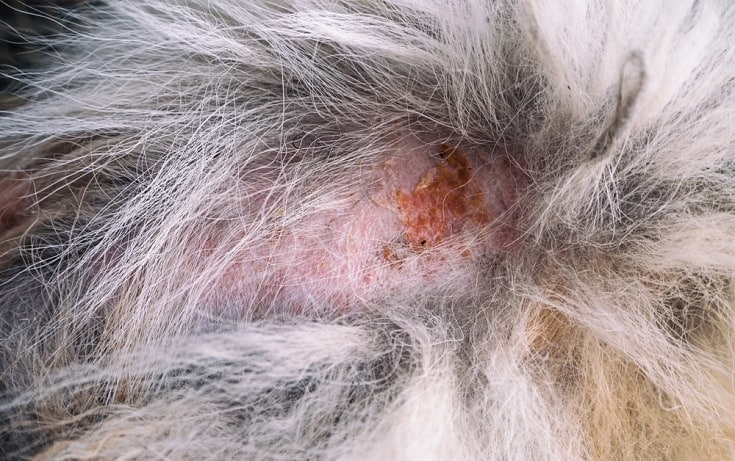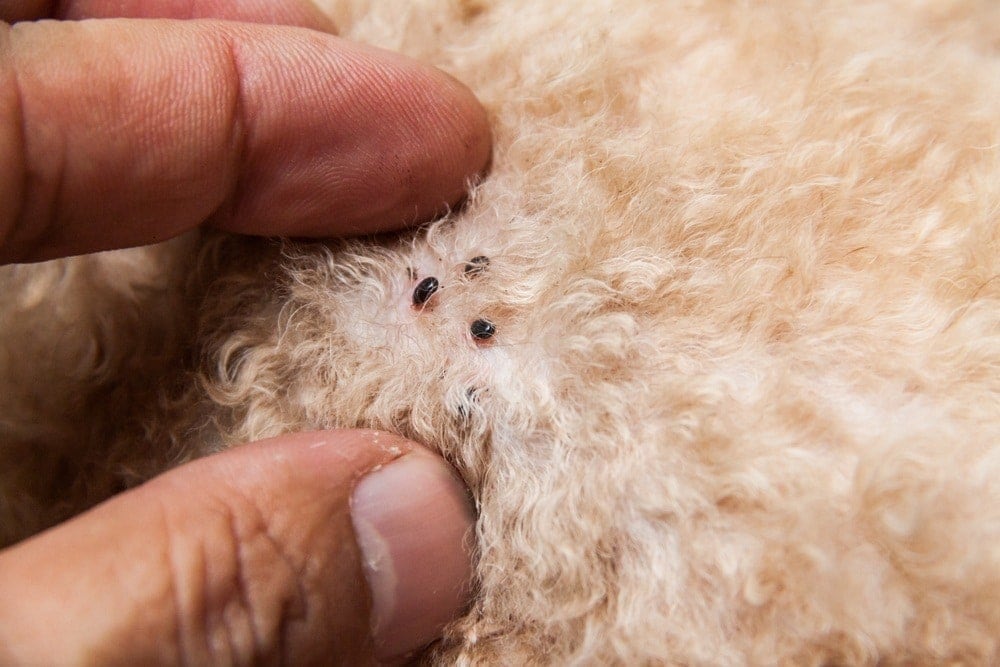My Dog Has Crusty Scabs on His Back: Vet Reviewed Causes & Treatments

Updated on

Dogs are generally healthy creatures but they are also curious and dirty. They will take any chance that they can to roll around in the mud, wander through dirty hiking paths, and chase other dogs at the dog park. So, when crusty scabs start to develop on their back, it can be tough to understand what in their life is causing it.
Could it be something happening inside the home? Is it a problem caused by exposure to the outside world somehow? Following is a list of the most common causes of crusty back scabs in dogs that should help you more easily narrow down the culprit.
The 5 Main Causes of Crusty Scabs on Your Dog (With Treatments)
1. Parasitic Infestations
Ectoparasites such as fleas and mites can infest your dog. These parasites feed on your dog’s blood or skin constantly biting and hurting it. Ectoparasites cause extreme discomfort and itchiness that results in scabs, secondary infections, and hair loss.
Flea Infestations
You can easily recognize a flea infestation by the presence of tiny insects hiding between your dog’s hairs. Small, dark, round structures are flea feces, and because fleas feed on your dog’s skin, if you collect them over a napkin and pour a little bit of water on top, you can appreciate the change of color to red.
Getting rid of a flea infestation will require not only treatment for your dog but also all around your home as fleas lay eggs and hide in small crevices all around the house.

Mites
Typical scabies is caused by the highly contagious parasite mite Sarcoptes scabiei that can infest a wide variety of mammals including humans. These mites burrow deep into the skin causing irritation, inflammation, and thickening of the skin or scab formation. Lesions in dogs are typically seen around the face, ear, and neck area but they can also develop in the back.
Some infestations are self-resolving but others can cause very dramatic-looking lesions. The veterinarian can diagnose scabies with a skin scrape, both topical and oral treatments are available.
2. Allergies
Allergies can play a big role in the overall health of your dog’s skin. Unfortunately, there are multiple types of allergens that your dog could be susceptible to. One of the manifestations of food allergy is dermatitis, causing swollen and very itchy skin. Your dog can develop scabs and secondary infections caused by constantly scratching its back.
Here are various kinds of allergies your dog might be dealing with that could result in crusty scabs developing on their back:
Food Allergies
Dogs can develop an allergy to some foods that could result in skin problems like itchiness and scabbing. Protein ingredients in their food become allergens when they cause an overreaction of their immune system. The most common food allergens for dogs are dairy, beef, lamb, chicken, eggs, soy, or the protein derived from wheat, gluten. Food allergies tend to develop and foods that were previously just digested can later elicit an allergic reaction.
Your veterinarian can help you determine which food is bothering your dog so you can avoid it and they can heal.
Flea Allergic Dermatitis
Fleas by themselves can cause a lot of discomfort to your dog causing it to scratch and develop scabs and skin infections. But issues complicate a lot when dogs develop allergic dermatitis due to a hypersensitivity reaction to flea saliva.
In these cases, a single flea bite can cause a lot of swelling, extreme itchiness, and long-lasting discomfort to your dog’s skin, resulting in crusty scabs and even hair loss along the back and in other areas of the body. Fleas tend to be the most common cause of skin allergies in dogs.
Getting rid of the fleas is the first step but your dog will need steroid creams and maybe some oral medications so bring your pup to the vet for assistance and treatment. A blood test can be performed to determine whether your dog is dealing with a flea allergy. Rigorous flea treatments and preventative measures likely need to be taken.
Atopic Dermatitis
Other possible causes of allergic dermatitis in dogs manifesting as red swollen and itchy skin and possible scabs include environmental allergens such include mold, pollen, and dust mites.
3. Skin Infections
Bacterial, fungal, and viral infections on the skin can cause itching, hair loss, dry skin, and scabbing if not treated. Secondary bacterial or fungal infection is caused when a dog breaks the skin while scratching. The broken skin can allow pathogens to enter and create an infection. Fleas, ticks, and mites could cause excessive itching and create a perfect scenario for secondary infections to develop.
Treatment includes cleaning the affected area with medicated shampoos or antiseptics regularly and applying topical medications.

4. Hormonal Imbalances
Hormonal problems can be caused by a lot of different things, such as testicle or ovary abnormalities, thyroid and pituitary gland imbalances, and an inadequate diet. Among various other symptoms, hormonal imbalances can result in hair loss, skin infections, itching, irritation, and scabbing.
Some hormonal imbalances can be corrected with appropriate treatment. A veterinarian should run specific tests to diagnose and suggest dietary changes or treatment options. Alongside treating the principal cause of the imbalance, scratching and scabbing relief can be provided with the help of things such as warm baths, a humidifier, apple cider vinegar, and calendula.
5. Nutricional Deficiencies
Diet can have a serious effect on a dog’s skin and health. When there are vitamin and mineral deficiencies, skin problems can develop. The skin and hair can start to look limp overall with dry, flaky skin, sores, and scabs. An unhealthy skin easily develops secondary infections and is very vulnerable to parasites damage. If your dog is developing crusty scabs on their back but has no other symptoms, there is a chance that their diet is not meeting its nutritional requirements.
Your dog’s health starts with the diet, look for good quality, species-appropriate complete, and balanced food. A veterinarian can help you choose the best option to restore optimal nutritional levels. Supplementing your dog’s food with fresh antioxidant-loaded fruits and veggie snacks can restore your pooch’s health.
Conclusion
Many different things can cause crusty scabs to develop on your dog’s back, but luckily, they are all treatable in one way or another. Most of the time, conditions can be treated once diagnosed. Sometimes a diet change is needed, other times a medical treatment. Hopefully, we have helped you make some sense of your dog’s scabbing problems and you’ll be able to correct the problem in no time.
Featured Image Credit: February_Love, Shutterstock












